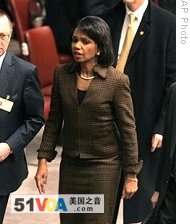Envoys Continue Negotiations at UN on Cessation of Gaza Fighting
Update Required
To play the media you will need to either update your browser to a recent version or update your
Flash plugin.
By Margaret Besheer
United Nations
08 January 2009  |
| U.S. Secretary of State Condoleezza Rice at the U.N. Security Council, 07 Jan 2009 |
Foreign ministers from the United States, Britain, France and the Arab League met separately and together behind closed doors at the United Nations Wednesday, seeking an end to nearly two weeks of deadly fighting in the Gaza Strip. After hours of talks, U.S. Secretary of State Condoleezza Rice told reporters that there "is still work to do" to reach a consensus. The U.S., British and French foreign ministers said they would stay in New York for a third day to lead Western efforts at finding a cessation of hostilities between Israel and Hamas militants. Following an evening meeting with Arab foreign ministers, U.S. Secretary of State Condoleezza Rice spoke briefly to reporters. "We believe there is still work to do. [French Foreign] Minister [Bernard] Kouchner, [British] Foreign Secretary [David] Miliband and I are extending our stays and we still believe there is work to do," she said. Arab ministers leaving the meeting echoed her response. The Security Council remains split over two possible responses to halt Israel's military incursion into the Gaza Strip to silence Hamas rocket attacks on southern Israel. One option is a legally-binding U.N. resolution demanding an "immediate and permanent cease-fire" and the lifting of Israel's blockade on Gaza put forth by council-member Libya on behalf of the Arabs. The other option is a weaker, non-binding statement, drafted by France, the United States and Britain, that emphasizes that a "durable cease-fire will require arrangements and guarantees", including preventing the smuggling of weapons to the militants and the reopening of border crossings. French Ambassador Jean-Maurice Ripert, whose country holds the council's rotating presidency this month, said all 15 members want to work toward a unanimous position but they are not there yet. "There is no unanimity today on either of those texts and because we want to go forward in a common approach we have decided to continue our talks and negotiations." Diplomats close to the discussions say there is some convergence on the substance, but not yet on the form it will take. Meanwhile, Egyptian President Hosni Mubarak has put forth his own initiative, offering to mediate between the Israeli and Palestinian sides in Cairo as soon as possible. But Egyptian Foreign Minister Ahmed Aboul Gheit told reporters that Israel has so far only agreed to send a high-level technical team to Cairo. "They [the Israelis] have been indicating willingness or that it is a positive step. But there is not yet a clear cut recognition and acceptance," he said. The United States, Britain, France and the Arab ministers will resume their negotiations Thursday morning.

